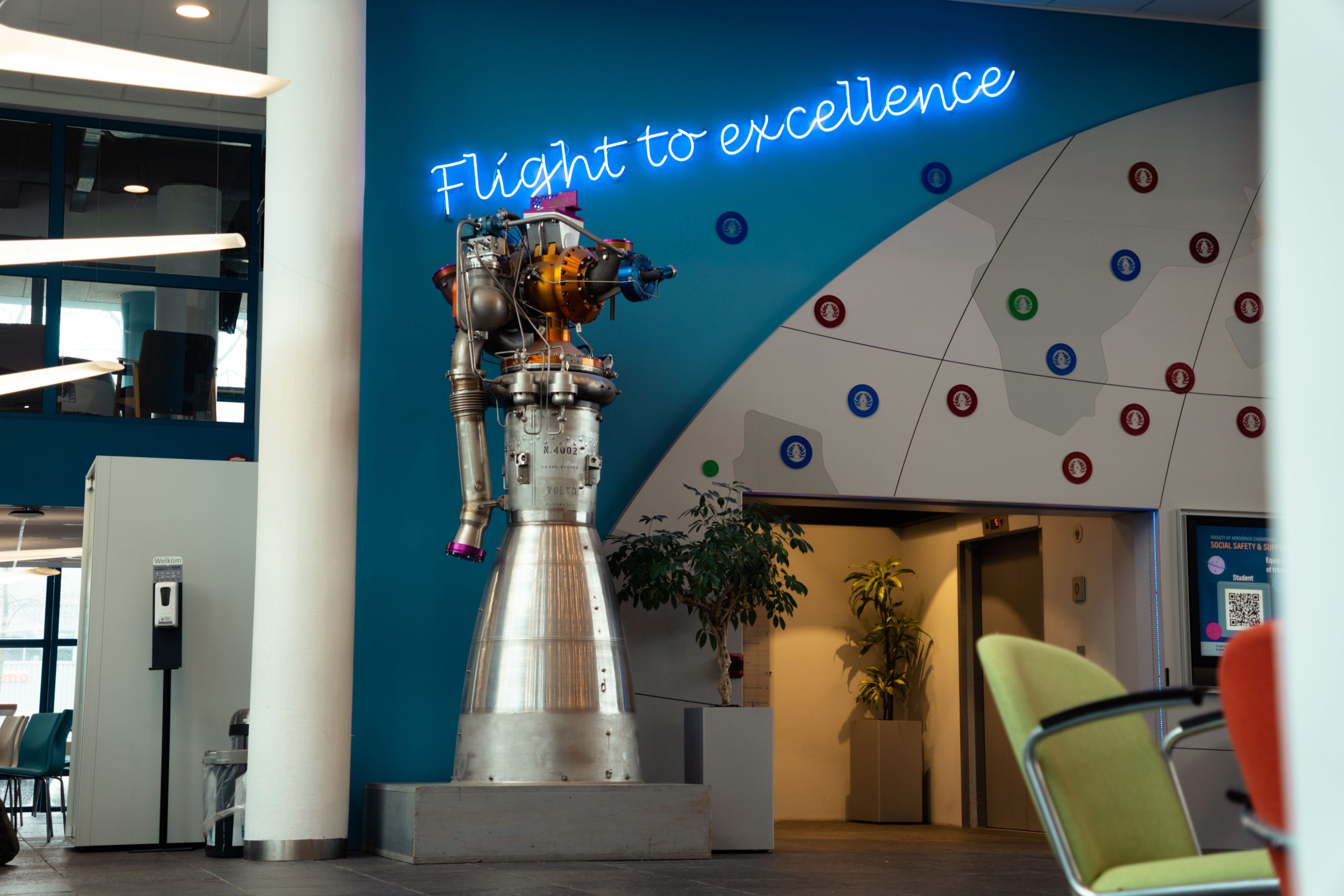Alex Nedelcu, Aerospace Engineering bachelor student, thinks his Faculty should not revert its bachelor’s programme back to Dutch, as Delta columnist Dap Hartmann suggested in his latest column. “To shut the door on international students would mean compromising TU Delft’s reputation on the world stage.”
(Photo: Thijs van Reeuwijk)
It was a happy (?) coincidence to read Dap Hartmann’s recent opinion in Delta only a few days after one of the editors interviewed me on my experience as an international student at TU Delft. Like all the international students in the Faculty of Aerospace Engineering (AE), I read Prof. Hartmann’s article with great interest, not least because it directly attacks one of the main reasons why our Faculty is so highly ranked in the world, namely its outstanding openness towards internationals.
Prof. Hartmann starts by appreciating the selection-based admissions of the Aerospace Engineering Faculty and lambasting any proposals for a lottery-based selection. So far so good. Then he falsely stated that ‘for Dutch students, one of the criteria for acceptance is their fifth-year secondary school grades’ (in fact, only a minimum level is required for all applicants, with admission being completely based on the selection procedure). This statement was indeed retracted due to its inaccuracies. In the following paragraphs, the author then narrows his view of meritocracy by restricting it to people with the same passport as him. So do we want a complete meritocracy or not?
Please decide, Prof. Hartmann.
Finally, the column states that there is no shortage of Dutch students who want to do the AE bachelor. Great! In my opinion, both they and the Faculty would benefit from their being tested thoroughly in an internationally competitive selection procedure (which is slightly in their favour through a motivation questionnaire that includes physical visits to the Faculty as proof of motivation). To paraphrase the author, we should not ‘award the gold medal in high jump’ based on country of origin, but rather based on knowledge, skills, and academic aptitude.
Beside the notion of meritocracy, the facts are simply not on Prof. Hartmann’s side. International students contribute strongly to the diversity of the academic community (and sometimes pay stinging tuition fees). They contribute to Dutch society. To name a few, they spend money, work, pay taxes, write Delta articles, and sometimes even settle in the Netherlands, which has a tight labour market and an expanding aerospace industry. Some go on to dazzling careers in research, either at TU Delft or elsewhere, putting TU Delft’s name on the world stage. Want to see what happens when they leave? Look at Denmark’s example.
‘Both the masters programmes and the aerospace engineering industry are highly international and anglicised’
Another more direct benefit of our Faculty’s openness to the world, as denounced by Hartmann, is its exceptionally high International Outlook score of 93/100 in the Times Higher Education rankings. To shut the door on international students would therefore mean compromising TU Delft’s reputation on the world stage.
Leaving the desirability of Hartmann’s desired policy change aside, let’s discuss how the Faculty of Aerospace Engineering could implement it.
Evidently, the teaching language would no longer be just English. Under EU law, European students have the same rights as Dutch students to apply to educational programmes, and as such any attempt at discrimination based on nationality within a purely English-language programme would be struck down in court.
So, we teach mainly in Dutch, in agreement with the promoters of the recent motion (in Dutch) in the House of Representatives. However, both the masters programmes and the aerospace engineering industry are highly international and anglicised, so students would have to go through a ‘translation phase’ that could hinder their performance in industry and academia.
But there’s another problem: a good 40% of bachelor courses have non-Dutch responsible lecturers, with internationals representing a high proportion of PhD students and post-docs. Should the bachelor programme be closed to international students, teaching opportunities for these staff members may be reduced, and they may no longer feel welcome in the cultural climate of the Faculty, choosing instead to pursue their academic career at a university that is more open to international perspectives.
What happens moving forward depends only on the values that TU Delft wants to embody. I myself hope that these values will be our claimed DIRECT (Diversity, Integrity, Respect, Engagement, Courage and Trust). In the meantime, rather than ask why the Netherlands is fostering international talent, maybe Prof. Hartmann could study how the country could retain this talent for the benefit of all involved. His last article, at least, didn’t help.
Alex Nedelcu is an international third-year bachelor student at the Faculty of Aerospace Engineering. He studies manufacturing-induced defects in composite structures as part of the Faculty’s Honours research programme. He is also a student representative in the Faculty’s Board of Studies, where he focuses on diversity and sustainability issues.



Comments are closed.